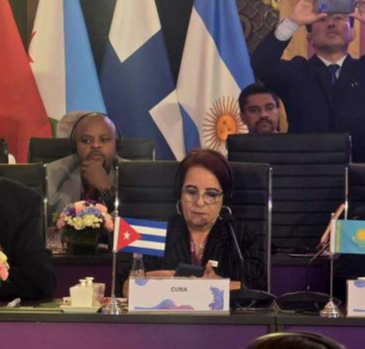
Pérez Cruz reaffirmed Cuba's defense of ethical, truthful journalism committed to the rights of the people. Photo taken from CubaMinrex
Havana, May 3 (RHC)-- The vice president of the Cuban Institute of Information and Social Communication, Belkys Pérez Cruz, denounced this Friday in Mumbai, India, the stigmatization of sovereign countries and the proliferation of fake news to justify imperialist interventions.
At the Global Media Dialogue in India's financial capital, the Cuban journalist defended her country's position, which is economically, commercially, and financially blockaded by the United States government and unjustly included on a list of states that allegedly sponsor terrorism.
She noted that countries such as Cuba itself, Venezuela, and the Palestinian people are victims of the stigmatization of nations that defend their sovereignty and the proliferation of fake news attempting to justify imperialist interventions.
Pérez Cruz also reaffirmed Cuba's defense of ethical, truthful journalism committed to the rights of its people, at a time when disinformation and media manipulation threaten the sovereignty of nations and global peace.
He also affirmed that in a global context where hegemonic narratives prevail, the island proclaims that information cannot be a privilege or a weapon of domination, but rather a citizen's right.
"The media must serve education, truth, and unity among peoples, not the interests of elites," she stated.
Regarding advances in Artificial Intelligence (AI), streaming, and virtual reality, the vice president of the Cuban Institute of Information and Social Communication considered that they should be tools to amplify marginalized voices, preserve endangered languages and traditions, and create accessible content for people with disabilities.
She noted that in the near future, with the increasing impact of AI, there will be benefits and improvements in various areas, but challenges related to ethical, legal, and privacy issues will also grow.
The Cuban official mentioned as an example new manipulative strategies ranging from identity theft (voice, image, or video) to fraud or extortion through a digital platform, application, or social network.
In this regard, she urged fostering ethical and cultural debates to define the best paths for the technological articulation of societies, while ensuring the preservation of their fundamental values, as well as developing legal frameworks.
She suggested greater global cooperation between governments, businesses, and international organizations to address these challenges, under increasingly inclusive and sustainable principles.
Pérez Cruz emphasized the need to promote narratives that foster intercultural dialogue and to produce entertainment with human values.
“We can build bridges or build walls. Cuba chooses to build bridges and work together for a more inclusive, creative, and humane audiovisual future,” she concluded.
(Source: Cubaminrex-PL)

